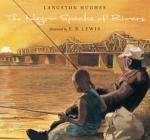|
This section contains 632 words (approx. 2 pages at 400 words per page) |

|
The Negro Speaks of Rivers Summary & Study Guide Description
The Negro Speaks of Rivers Summary & Study Guide includes comprehensive information and analysis to help you understand the book. This study guide contains the following sections:
This detailed literature summary also contains Bibliography on The Negro Speaks of Rivers by Langston Hughes.
"The Negro Speaks of Rivers" is a short, evocative poem written by Langston Hughes when he was only seventeen. Despite Hughes's relative lack of real-world experience, the work embodies a wisdom and cultural awareness far beyond the poet's years. The poem's narrator evokes images that span thousands of years and thousands of miles, relating the experiences of all black people throughout history to himself in his present day.
Hughes wrote the poem while traveling by train across the Mississippi River on a trip to Mexico. Biographer Arnold Rampersad, in his book The Life of Langston Hughes, tells the story:
The beauty of the hour and the setting—the great muddy river glinting in the sun, the banked and tinted summer clouds, the rush of the train toward the dark, all touched an adolescent sensibility tender after the gloomy day. The sense of beauty and death, of hope and despair, fused in his imagination. A phrase came to him, then a sentence. Drawing an envelope from his pocket, he began to scribble.
The poem was published in The Crisis, the official publication of the National Association for the Advancement of Colored People (NAACP), in June of 1921; it was Hughes's first professionally published work. From this short debut poem, however, readers could already see that Hughes had the potential to become an influential voice in American literature. When Jessie Fauset, literary editor of The Crisis, first read the poem, she showed it to W. E. B. Du Bois—cofounder of the NAACP—and asked, "What colored person is there, do you suppose, in the United States who writes like that and is yet unknown to us?"
"The Negro Speaks of Rivers" offers a sweeping portrayal of the vast black experience in just over one hundred words. The poem focuses on four rivers—the Euphrates, the Congo, the Nile, and the Mississippi—and nods to each river's role in the narrator's cultural history. Despite the narrator's repeated use of the pronoun "I," the reader quickly realizes that the narrator is not an actual individual person and indeed could not be since the events described in the poem take place over such a wide span of human history. The narrator is the embodiment of all black people and shares in the experiences of all who have come before him. The poem carries a message of unity and connectedness among Africans and their descendants—a message not frequently heard at the time.
Hughes continued his successful career as a poet even as he attended college at Columbia University pursing a degree in engineering. He eventually left Columbia, completing his education at Lincoln University while continuing to write. His first published book, a collection of poetry called The Weary Blues (1926), marked the first book publication of"The Negro Speaks of Rivers." The poem appeared again in Hughes's The Dream Keeper and Other Poems, a collection aimed at young readers and first published in 1932.
Despite Hughes's youth and comparative lack of practice as a poet when it was written, "The Negro Speaks of Rivers" remains one of his most anthologized poems. It has also inspired composers, two of whom have set the poem's words to music as a song. The poem's positive message extends beyond the time in which it was written and invites modern readers to share in a celebration of cultural awareness just as relevant today as it was in 1920. As Jean Wagner writes in Black Poets of the United States:
"The Negro Speaks of Rivers" heralded the existence of a mystic union of Negroes in every country and every age. It pushed their history back to the creation of the world, and credited them with possessing a wisdom no less profound than that of the greatest rivers of civilization that humanity had ever known.
Read more from the Study Guide
|
This section contains 632 words (approx. 2 pages at 400 words per page) |

|



